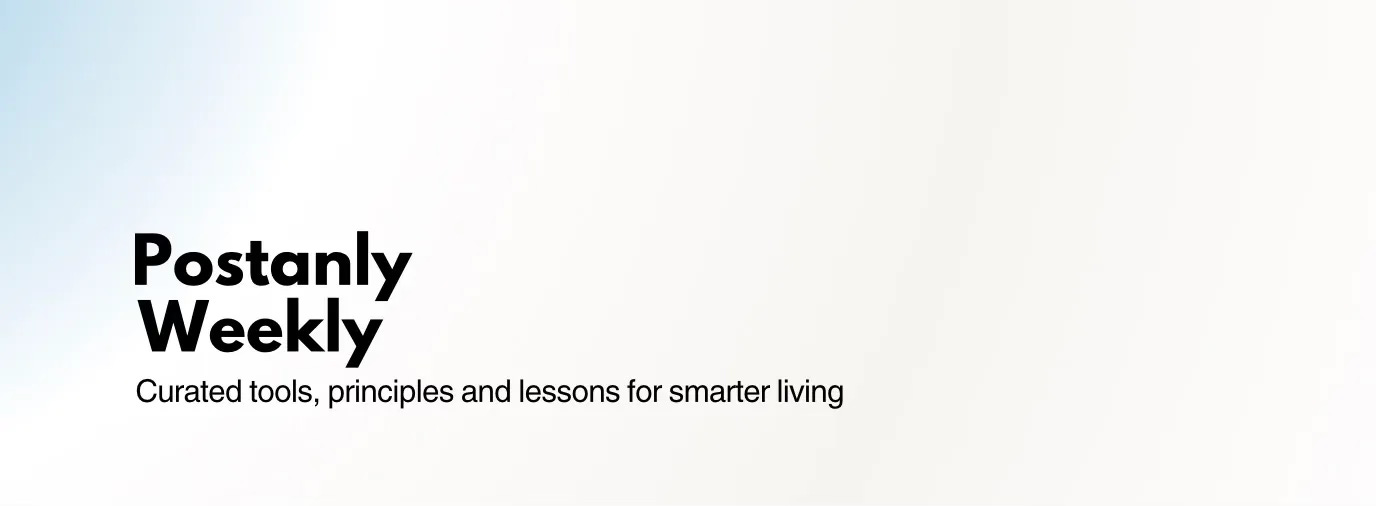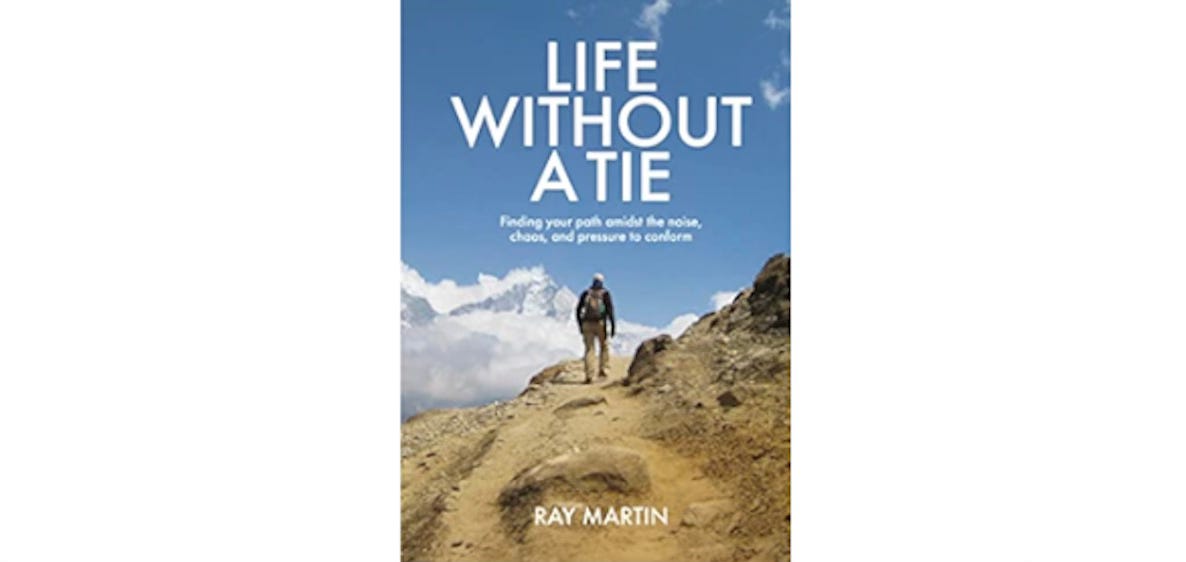40 simple rules for life
100 tiny tricks to help with everything
Hello everyone,
Postanly Weekly is a reader-supported smarter living newsletter. To support my work, you can upgrade to a paid subscription for $7 per month or $40 for an entire year. With a modest yearly contribution you’re not only helping keep Postanly Weekly going, you also get free access to Thinking Toolbox (mental models for life) and Mental Wealth Toolbox (practical concepts for smarter decisions).
Together with Life Without A Tie, a must read book for anyone at a cross roads in life. An incredibly honest story on the courage to live autonomously and with purpose.
How a random, unforeseen series of events helped coach, mentor, facilitator, speaker, writer, and mindfulness teacher Ray Martin strengthen his inner guidance, deepen his humanity, and forge a new, conscious path in life.
This book will fill your heart with courage.
Ray shares a personal story of why there’s more to our experiences on earth than simply birth, school, work, and death. Find out what his six rules for happiness are and how you can author your own so that you can connect to your own heart, inner wisdom and strength.
40 simple rules for life
We all want to live a good life. Most people look for the one thing they can do to improve everything. They look for answers everywhere — in books, newsletters, at conferences, in great movies, and even in videos on YouTube. But whatever we find must be tested or applied to know what works for our specific life. Because What works for that thought leader might not work for you. Your life circumstances, your experiences—they’re yours alone.
However, common themes come up again and again as universally beneficial advice.These are not tied to a specific culture, era, or person. They’re timeless. Good rules for life are universal. They don’t tell you exactly what to do, but they push you to rethink your reality. They challenge us. They force us to reflect, to ask how we can be better.
There are countless philosophies out there—Stoicism, Buddhism, existentialism—each offers their own take on meaning and happiness. But at their core, they share similar themes. Living with intention. Taking responsibility. Making room for gratitude. Being present. These rules are not just trendy advice—they’re rooted in what humans have been wrestling with for thousands of years. So, while no one can give you a perfect blueprint for life, you reflect on these for a healthier, happier, and more fulfilling existence.
All dependency leads to misery. You won’t be totally free if you are completely dependent on a single income, people or technology.
Don’t believe everything you read. The news is designed to take advantage of human psychological weaknesses. Question the obvious.
Think for yourself. If a decision or choice affects your future, find the first, second and third order consequences yourself.
“The greatest happiness is to know the source of unhappiness.” ― Fyodor Dostoyevsky.
You have the right to change your mind. If you find good evidence that challenges your basic assumptions about life, use it for a better life.
You are responsible for the trajectory of your life — don’t make that someone else’s duty.
Improve and respect your opinion about yourself. It’s the only validation you need to design the life you want.
Lose the busy life — it’s one of the greatest obstacles to a happy life. “A happy person has no time to be busy.” Get busy living or get busy dying.”
― Stephen KingLearning is for life — always be learning. It’s the only way to evolve into a better version of yourself.
“Your whole experience of life is in your mind. Focus on your internal world, not external world.” — Derek Sivers
Find someone you won’t have to change for a happy and fulfilling relationship — you can’t change anyone.
Create as many sources of income as possible — your financial independence depends on it.
Learn from the smartest people. Read biographies — they are packed with lessons, principles and rules for life.
“You have succeeded in life when all you really want is only what you really need.” Vernon Howard
Time is the most significant currency of life — defend it, invest it and commit to the right things that can help you live your best life.
Life is meaningful if you influence it. Find your own meaning.
All life is an experiment in progress — there is no perfect outcome. Do more of what makes you come alive.
When you feel stuck, think forward and backwards; reverse engineer the problem. Deconstruct what you’ve already done.
Commit to a few good habits that are helping you make progress. 80% of your results come from 20% of your habits.
“Good friends, good books, and a sleepy conscience: this is the ideal life.” ― Mark Twain
Build a life, not a career. If you don’t like what you do for work, get to know yourself and invest in micro-skills that can make you indispensable.
Invest in experiences that make you come alive, not things. Make memories.
Commit to one thing at a time — it’s a better way to invest time and energy and get results faster.
Don’t spend a lot of time in your head — mental clarity depends on it. Be more observant; notice twice.
“Life is a series of natural and spontaneous changes. Don’t resist them — that only creates sorrow. Let reality be reality. Let things flow naturally forward in whatever way they like.” Lao Tzu
Don’t keep too many things on your mind — learn to offload your thoughts on paper. It’s a way out of worry.
Action is optional. You don’t have to act at all, especially if your future self will be worse off.
Tame your ego. Angry reactions are irreversible. People destroy decades of social connections because they can’t control themselves.
If you are trying too hard to be happy, you are doing it wrong. Take things one day at a time. “Begin at once to live, and count each separate day as a separate life.” — Seneca
A growth mindset changes everything — live your entire life in this mindset. “Don’t go through life, grow through life.” — Eric Butterworth
You don’t need validation or permission to pursue your true north.
If you want to build wealth, become an investor; buy your own business or buy a stake in a company you understand and hold forever.
Play the long game. Do small good things for as long as possible. Put time to work and compound good actions.
“Most people overestimate what they can do in one year and underestimate what they can do in ten years.”― Bill Gates
Experience the unconventional. Disrupt your routine on purpose.
Master something or anything that makes you lose yourself. Be so good they can’t ignore you.
Separate almost everything into two: things you can control and those you can’t. Don’t waste time and energy on what you can’t influence.
Focus on everything happening for you instead of what’s happening to you. That’s how you maintain a grateful mind.
To make more progress at work, maintain two to-do lists: high-value and low-value tasks. Start your day by checking off high-priority things.
Self-ignorance is a massive obstacle to a meaningful life. Dig deeper into what makes you miserable and what makes you come alive. Get to know yourself. What do you really want in life? Use the answers to design the life you expect of yourself. “If you don’t know where you’re going, any road’ll take you there.” ― George Harrison
Food for thought
5 Golden Rules of Life Satisfaction [Free read on Medium]
2. Get out of your own way
Jean Vanier, a Canadian philosopher, theologian, and author of Tears of Silence once said, “He who clutches desperately to security, to everyday habits, work, organization, friends, family, no longer lives. More than security, life needs adventure, risk, dynamic activity, self-giving, presence to others.”
How to recover from burnout [Psyche]
Anyone who is experiencing chronic work stress can develop burnout – people of any age, gender or socioeconomic standing, and from all walks of life – but there does seem to be greater risk for those who:
invest a lot of their time and energy into their work
have jobs where they must interact with people – such as customer service jobs, or helping professions like social work and teaching
frequently work in emotionally charged situations, like emergency response or other high-pressure or high-conflict settings
have a high workload, or have too many demands and/or too few resources
work on competitive or uncooperative teams, or in workplaces that are unsupportive of employee wellbeing
feel unappreciated or undervalued at work
hold personal values that don’t match those of their organisation
work in industries such as healthcare, where there is a cumulation of these types of factors
3. Try a triple list
The first of several list suggestions on this, er, list. “Every day I list three things I must do: one annoying task (eg, post letter), one uncomfortable one (eg, attend gym class) and one painful one (eg, no sugar). Having three of varying discomfort means I am more likely to do the lesser ones as a way to productively procrastinate on the bigger one.” Fionnula, reader
An idea by author James Clear I’m pondering:
"There are 3 primary drivers of results in life:
1) Your luck (randomness).
2) Your strategy (choices).
3) Your actions (habits).
Only 2 of the 3 are under your control. But if you master those 2, you can improve the odds that luck will work for you rather than against you."
A piece of advice worth passing on:
Bring that same discipline, work ethic, and organisation from your work into your personal life. Don’t just use your best skills for someone else’s gain. I think it’s important to save a little gas in the tank, to ensure both your personal and professional goals become reality.
An Infographic I find useful

> My best newsletter recommendations
Have a look at our favourite picks → Topics covered: learning, finance, starting up, productivity, technology, career, better living, seo, venture capital and more.
Explore the complete list of newsletters
Work with Postanly. Partner with us here.
Thanks for reading!
Until next week,
Thomas
Medium | All Courses | The Write Life | Philosophy For Modern Life
Postanly Weekly is now a reader-supported publication. To support my work, you can upgrade to a paid subscription for $7 per month or $40 for an entire year. With a modest yearly contribution you’re not only helping keep Postanly Weekly going, you also get free access to Thinking Toolbox (mental models for life) and Mental Wealth Toolbox (practical concepts for smarter decisions).




These are so good ❤️